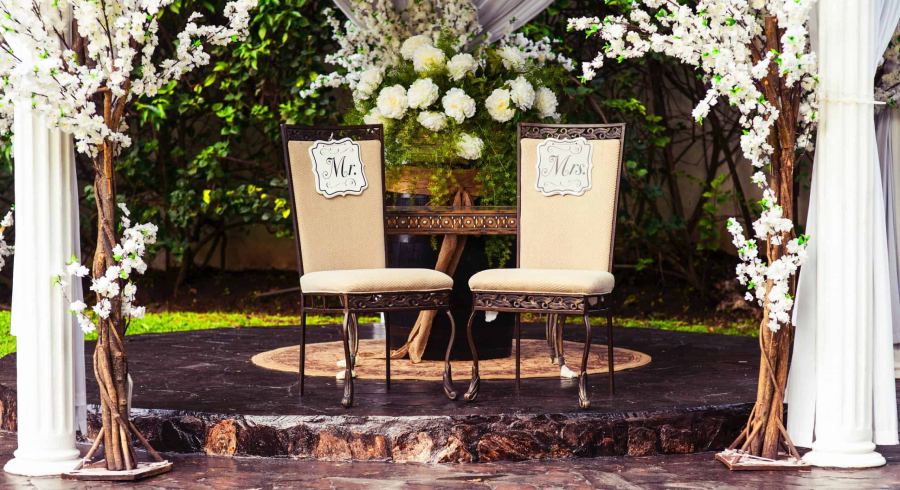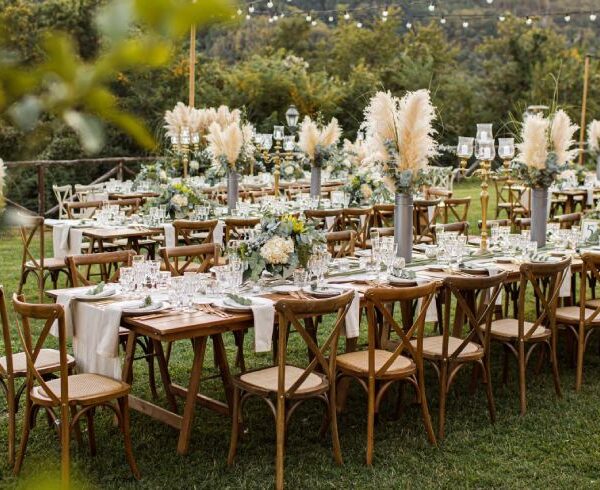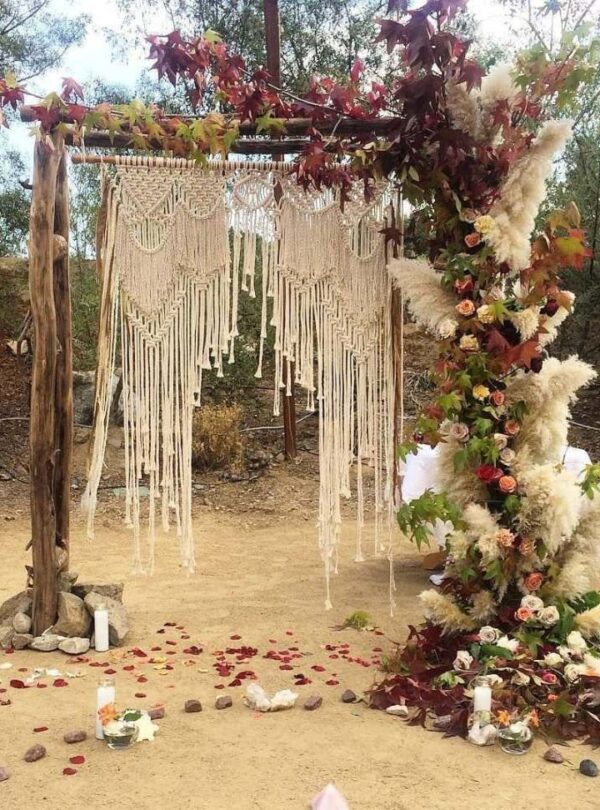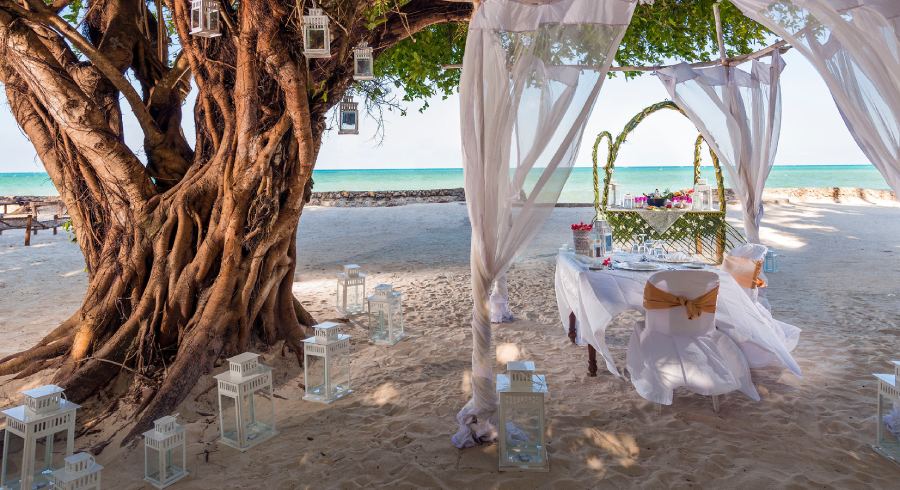Overview
Naturalness and artistic eclecticism — Boho Style is currently the biggest trend in wedding organization in Zanzibar and Tanzania. It perfectly complements the scenery of Tanzania and Zanzibar: elegant, yet chilled out, natural, and fanciful.
For the bride, we will prepare a flower crown, and the wedding decorations will be made from natural materials such as shells, wood, lanterns, candles, and dried grass.
Includes/Excludes
Cost Includes
- Fixing the date and place of the ceremony with a Civil Status official.
- Submitting the required documents to the registry office of Tanzania.
- Marriage ceremony conducted by a Civil Status official.
- On the day of the ceremony, transfer from the hotel to the wedding location and back (for up to 4-5 guests).
- Decoration of the wedding location in a boho style.
- A bouquet and a flower crown for the bride, and a buttonhole for the groom, made from local flowers.
- A bottle of sparkling wine.
- The Masais.
- Legalization of the wedding certificate.
Cost Excludes
- Professional photographer during the wedding and a photo shoot after the ceremony .
- Romantic dinner for 2 pax.
- Hair styling and makeup .
- Wedding cake .
FAQs
Traditional Tanzanian weddings often see the bride in brightly coloured ‘kitenge’ or ‘khanga,’ vibrant African fabrics. The groom may wear a matching shirt to the bride’s dress or a Western-style suit. Guests are usually encouraged to wear African prints or formal attire; dress code details are often provided on the invitation.
Tanzanian weddings are rich in customs, varying widely among different ethnic groups. A common practice is the dowry payment, known as ‘Mahari,’ which is negotiated between the groom’s and bride’s families. Ceremonies often include traditional music, dance, and sometimes a ‘kitchen party’ where the bride receives gifts for her new home.
Food at Tanzanian weddings typically features local cuisine, such as pilau (spiced rice), nyama choma (grilled meat), and ugali (maise porridge). Side dishes may include chapati (flatbread), vegetable stews, and tropical fruits. Meals are central to the celebration and are shared with all guests.
Weddings in Tanzania can last anywhere from one day to a whole week, depending on the region and the customs followed. The main ceremony and reception are usually held on one day, but there may be other events before and after, such as the dowry negotiations and family introductions. It’s common for the celebrations to continue with dancing and socialising long into the night.
To legally marry in Tanzania, couples must register their intent with the local authorities and fulfil a waiting period. A government official then conducts civil ceremonies. Religious and customary ceremonies may also occur, but these need to be complemented by the legal civil marriage to be officially recognised.
Yes, foreigners can get married in Tanzania, but they must meet all legal requirements, including residency stipulations and providing relevant documents like passports and birth certificates. It’s advisable to contact the local registration office or embassy for specific information and possible need for translations or legalisations of documents.
At Tanzanian weddings, guests usually bring gifts in the form of money, household items, or livestock. Gifts are often presented ceremonially, emphasising support for the newlyweds’ new beginning. Gift registries are becoming more common in urban areas, guiding wedding attendees.
Wedding invitations in Tanzania may be distributed in person, common in rural areas and among close-knit communities. Printed or digital invitations are becoming increasingly popular in urban regions and among the middle and upper classes. Word of mouth is also common, especially when large communities are involved.
In Tanzanian wedding customs, the grandiose entrances of the bride and groom hold a spot in the day’s spotlight. The bride’s arrival is typically marked by an entourage of women garbed in traditional attire, their steps keeping time with the rhythm of local tunes.
The groom’s entry, buoyed by a procession of kith and kin, sets a lively tone for the occasion. These theatrical arrivals ignite the festivities and symbolise the start of a new shared journey for the betrothed couple.
A Tanzanian wedding often incorporates religious customs according to the couple’s faith, grounding the celebration in spiritual significance. In Christian ceremonies, couples typically exchange vows in a church, with blessings and sermons led by the clergy.
On the other hand, Muslim weddings feature the ‘Nikah’ — a solemn contractual agreement conducted in the presence of an Imam. However, regardless of religious dictations, Tanzanian weddings often pay homage to traditional beliefs and practices, threading a cultural continuity into the fabric of the celebration.
The Send-Off Party is a distinctive Tanzanian pre-wedding custom, honouring the bride’s journey into matrimony in a more ceremonious manner than a typical bridal shower. Guests of close female relatives and friends gather to share advice and blessings and sometimes indulge in dancing with the bride dressed in a Western-style gown.
Heartfelt speeches from the bride’s elders impart marital wisdom, while light-hearted moments cement the vital connections among the women present. This significant event highlights the bride’s support network, emphasising their ongoing roles as she embarks on her new chapter as a wife.
Mhiko represents a pivotal moment in Tanzanian wedding traditions, as the groom publicly declares his resolve to assume marital duties in front of respected elder figures. This promise solidifies his resolve to ensure the happiness and prosperity of his bride and the family they will build together.
Though Mhiko’s content will adapt to social norms and reflect the cultures of specific ethnic groups, the central themes of support, loyalty, and reverence tie together each variation. This public avowal fosters trust and community support, reinforcing the importance of marriage as a lasting, enduring partnership.
The ‘mhiko’ serves as a clear commitment, revealing the groom’s preparedness to accept all responsibilities that marriage entails, often articulated in front of senior family members. It is a formal assurance to the bride’s family, underlining his dedication towards his future wife’s welfare and the well-being of their prospective family.
The substance of ‘mhiko’ can touch on various aspects, such as expectations of support, fidelity, and respect, tailoring it appropriately to align with the values of the specific ethnic tribe. Despite the unique permutations, the underpinning essence of ‘mhiko’ remains consistent across tribes—it is a solemn pledge of lifelong commitment.
The wedding cake tradition can be traced back to Western culture but has found its place in Tanzanian matrimonial ceremonies as a centrepiece of the reception. Typically, the newlywed couple makes the first cut, symbolising unity, joint venture, and shared future.
Tanzanian wedding cakes are often massive, multi-tiered structures decorated intricately to match the wedding theme or the couple’s tastes. Serving the cake to guests is more than a dessert course; it represents the couple’s commitment to mutual generosity and sharing life’s bounty with their loved ones.







